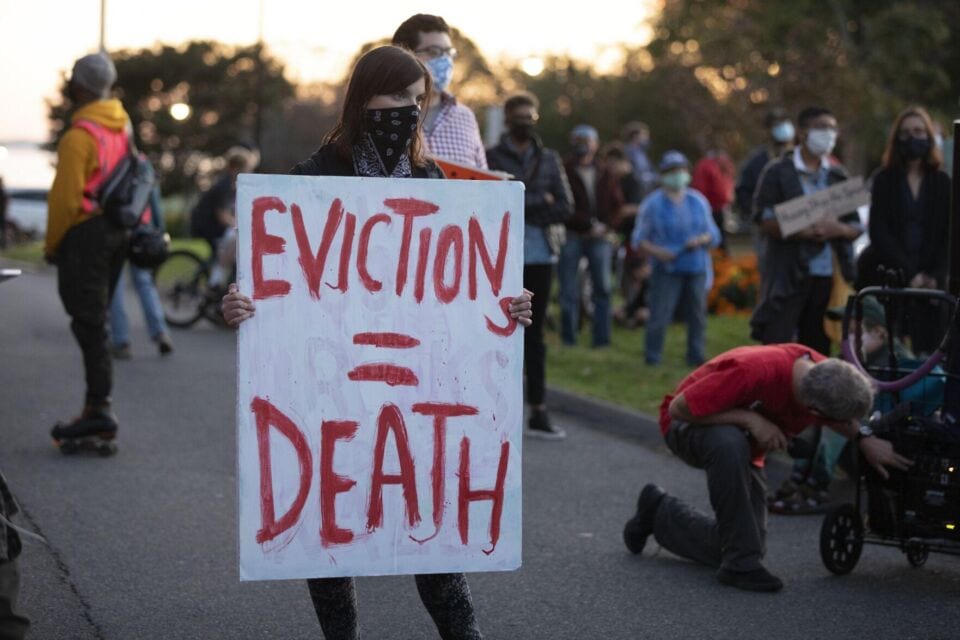
February 3, 2021
Hundreds of actions taken related to December evictions, state report shows
BY The Berkshire Eagle
A federal moratorium prevents some evictions, but Massachusetts courts still issued hundreds of orders that allow property owners to repossess residential units.
Of the 449 such measures issued in December for possession or money judgment, 353 were for nonpayment of rent, according to a Jan. 15 report from the Executive Office of the Trial Court. The measures are termed “executions” and can authorize local sheriff’s offices to remove people from housing.
Some tenants, that data suggests, are falling through the cracks of the Centers for Disease Control and Prevention moratorium, which tenants hurt by the pandemic can invoke if they file an eligibility declaration. That moratorium, recently extended through March 31, offers less comprehensive protection than the statewide moratorium, which expired in October.
“Our elected leaders just need to stare at that and decide whether they’re willing to have people thrown out of their homes during this pandemic,” said Pamela Schwartz, executive director of the Western Massachusetts Network to End Homelessness. “And as long as you involve the courts as opposed to treating this as the public health emergency that it is, that’s going to keep happening.”
The “huge numbers” of court cases have overwhelmed groups that help tenants facing eviction, although the $171 million the state invested when it let the moratorium end has expanded some organizations’ capacities.
Legal representation for tenants lags behind representation for landlords, a problem that drew a $12.3 million state investment in legal aid.
Community Legal Aid, which provides free civil legal services to low-income or elderly residents of Berkshire, Hampden, Franklin, Hampshire and Worcester counties, was one recipient of that money. The group brought on 30 temporary staff members, including attorneys who help with court appearances and paralegals who assist with rental assistance applications, said Managing Attorney Jennifer Dieringer.
“There’s always a much higher percentage of landlords being represented than tenants, but I do think this funding is going a long way,” Dieringer said.
A December law also requires reporting on continuances and stays issued due to pending rental assistance applications, but the trial court said it’s still creating procedures to record that data.
While the state made $100 million available for a key rental assistance program, staffing issues have slowed use of that money. The state distributed $22.6 million through Residential Assistance for Families in Transition (RAFT) by mid-January, leading regional agencies to add more than 200 new staff, CommonWealth Magazine reported.
Although recent changes have streamlined applications, some tenants struggle to access the online system, sometimes due to connectivity issues, and difficulty accessing the required documents often delays the process, Dieringer said.
Gov. Charlie Baker’s fiscal year 2022 budget recommendation, released Wednesday, also worried some housing advocates.
The Home and Healthy for Good program, which seeks to connect people facing long-term homelessness with permanent housing solutions, would go from $3.89 million to $2.89 million under Baker’s budget. Sheltering and transitional housing money also would decrease, from $56.425 million to $53.355 million.
Last year, some lawmakers had tried to pass An Act to Guarantee Housing Stability, which would have paused evictions for pandemic-caused inability to pay while providing grants, loans and tax credits to landlords. A similar push might come in the new legislative session, which began Jan. 6.
“We all have a stake in these rental units staying afloat, and any legislated solution to protect tenants from eviction must include support and relief for small landlords,” Schwartz said. “They go hand and glove.”
Schwartz also expects another push to establish a right to counsel this session. While the increased legal aid resources make it easier for tenants to access counsel, a right to counsel provision would require the state to provide a lawyer for tenants before cases proceed.
Of the more than 4,000 nonpayment eviction cases filed in Massachusetts since the state moratorium expired, about 150 have come in Berkshire County. The proportion of tenants with representation is not quite as low as the 0.9 percent suggested by the trial court report, Dieringer said. Legal representation was recorded for just 38 of 4,418 tenants in December eviction cases, according to the report.
But, even when a tenant has an attorney, the attorney typically does not make a court appearance until a court date is set. Since courts are backed up, partly due to a pre-pandemic backlog, court dates for many cases filed in December had not even been set at the time of the report.
In the four Western Massachusetts counties alone, Community Legal Aid handled 250 eviction cases from Oct. 19 to Jan. 24.
Yet, a disparity between landlords and tenants, especially those who are considered low-income, is undeniable.
“However you cut it, it’s a massive gap,” Schwartz said. “It’s not a defective number to the point that there’s not a huge gap.”
If you’re facing eviction…
See if you’re eligible for the federal moratorium: tinyurl.com/ybhe9ujk.
Advocates usually recommend that tenants who have had an eviction case filed in district court transfer the case to housing court, which often is better suited to connect tenants with resources.
But, the courts have been interpreting the federal moratorium in different ways. While district courts have stopped hearing cases for tenants protected by the moratorium, Western Housing Court will hear cases but avoid issuing an execution until the moratorium expires.
Tenants facing eviction should decide whether to transfer their case to a different court on an individual basis, said Jennifer Dieringer, managing attorney for Community Legal Aid.
Tenants with a household income of up to 200 percent of the poverty level (about $4,367 a month for a family of four) can seek free legal assistance from Community Legal Aid, which has offices in North Adams and Pittsfield, at 855-252-5342 or communitylegal.org.

















































